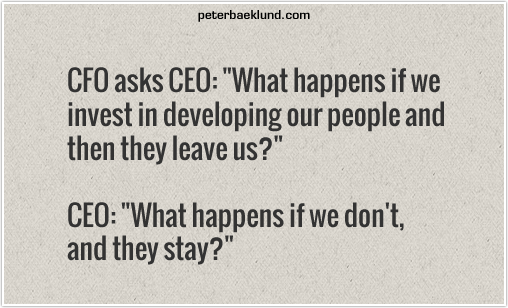Find a job you love and you will never work a day in your life
Confucius may have had it right, but I wonder how many of us ever attain that kind of employment euphoria? And for those who do, what does a job like that actually look like?
Most of us can probably think of people who love their jobs. They’re not that hard to spot. There’s a certain spring in their step. There is enthusiasm in their demeanor. They see challenge as an opportunity. They view their work positively and approach problems constructively. They have confidence in those who lead and support them. They enjoy interacting with colleagues, clients, customers. They are visibly energized by work that aligns with their passions, interests, and skills. These people rarely complain about a work shift dragging on. For them, the clock often moves too quickly. While fair remuneration is important, the job has far more meaning than the paycheque alone. These people can be found in any job – in any line of work.
In a 35-year career, I’ve encountered a number of people who fit the description. People I’ve worked with, and for. People who reported to me. People employed by suppliers and business partners, family members and friends. But the fact they stand out as somewhat unique over the course of a few decades and hundreds of examples to draw from, suggests this ‘perfect fit’ with a job, is far more the exception than the rule.
*************************
There are some practical impediments that tilt the odds against people landing a job they could say they truly love. From the outset, finding a path to it, is largely based on opportunity and life priorities. While there is certainly some degree of personal control and self-direction in the equation, opportunity to find that perfect job will often be a function of employment demand – and the economic, community, and educational realities that prevail.
What then are some of the things that may prevent us from finding the job we love?
A means to an end: For many – at least in the early stages of a career – the first priority is getting work. The reality is we need to pay the bills and cover necessities more than we need work that feeds the appetite of personal achievement and self-fulfillment. The advanced layers of Maslow’s Hierarchy of Needs – the cornerstone of psychologist, Abraham Maslow’s study on human motivation – are not yet reached. A young career is usually weighted at the bottom end of the triangle. It’s generally loaded with debt and expense: a mortgage or rents; utilities; educational debt; feeding and clothing young children. This is not usually a time to be overly fastidious.
 There are exceptions, of course. Some people are career-focused early in life. They pursue the education and training programs that earn them competitive advantage for professional careers or trades of their choice. These people are clear in their priorities and create an opportunity to secure – or at least start down the right path – to a job they love.
There are exceptions, of course. Some people are career-focused early in life. They pursue the education and training programs that earn them competitive advantage for professional careers or trades of their choice. These people are clear in their priorities and create an opportunity to secure – or at least start down the right path – to a job they love.
For the rest, it’s more a job that can be had than a job that would be loved, that takes precedence in the early days.
Accessibility: For some there are simply fewer options. This may arise out of geography, or it may be a function of economic conditions. A mining town or a farming community is apt to produce miners and farmers. Some will undoubtedly love their work. For others it’s a matter of conforming to what the environment yields. People growing up in communities built around anchor industries, will often follow parents, and grandparents into the plant. Others move naturally into the family business. Short of being prepared and able to move for alternatives, some will just take what their community gives them.
Jobs of any sort are dependent on the economic conditions of the day. Mines close, manufacturers move, businesses and civil services down-size, retailers fail. Any of these events render ‘love of the job’ somewhat moot when a displaced workforce scrambles for an alternative source of income.
 Education / Qualifications: The job of our dreams may be out of reach based on educational prerequisites and grade standards, physical qualifications, or skills requirements. We may aspire to be a doctor, electrician, lawyer, pilot, teacher, business leader, artist, firefighter, or professional athlete – but can we afford and qualify for the education to get us there? Do we have the skills and abilities? Can we meet the physical requirements of the job?
Education / Qualifications: The job of our dreams may be out of reach based on educational prerequisites and grade standards, physical qualifications, or skills requirements. We may aspire to be a doctor, electrician, lawyer, pilot, teacher, business leader, artist, firefighter, or professional athlete – but can we afford and qualify for the education to get us there? Do we have the skills and abilities? Can we meet the physical requirements of the job?
For today’s new entrants to the workforce, education may not even be enough. For the millennial wave of job hunters – dubbed ‘Generation Screwed’ in Maclean’s and Newsweek stories on the subject – the chance to be master of one’s own destiny appears to be far less likely than for the generation before them.
In a recent airing of CBC’s The National, it was reported that the unemployment rate for young adults age 15 to 24 was 14.1% at the end of 2012 – up from 11% in the summer of 2008. A trend likely exacerbated by an incumbent workforce unable, or unwilling to give up jobs at ages well beyond traditional retirement norms.
Being unable to land the ideal job requires us to either adjust focus and find another line of work we may learn to love – or settle for something that best uses our skills and meets our interests while we await an opportunity that puts us back on track with ‘Plan A’.
*************************
But not everyone faces these obstacles. What about those who are established in a job and do have the qualifications, access to options, and enough financial security to consider change? It may be that people are held to jobs they are not particularly passionate about – or in some cases dislike – by more subtle forces of inertia. It may be fear of taking a chance, or lack of confidence. Perhaps it’s a “better the devil you know than the devil you don’t” philosophy, or an investment in the prospect of things awry being fixed.
It would seem clear that employees ‘settling’, would not be a particularly fulfilling scenario for themselves, nor would a pervasive malaise be beneficial to the employer. The upside, is even small changes made to bring a fuller sense of personal satisfaction and accomplishment to the work of valued employees, sets the stage for a powerful ‘win-win’.
*************************
I believe there are three main factors that contribute to a job that approaches that “… never work a day in your life” state of bliss. The order of significance may vary by individual. Within a job, the presence of each may shift by project, task, and the applicable mix of people.
A job measured favourably in all three areas is quite likely a job loved.
- Aligns with passion, character, and talent.
- Interacts with capable and enjoyable people.
- Provides opportunity to realize accomplishment.
 Aligns with passion, character, and talent. This is perhaps the greatest determinant for a job that’s loved, yet it may be the one that’s most often missing from the mix. Work that aligns with the core of one’s interests and abilities is a natural and powerful motivator. It seems more like vocation, than work. For some, careers will ultimately be guided back to the passion when opportunity allows. Others will make the best of jobs without it. According to a palliative care nurse, the most common response on a list of regrets among the dying, related to unfulfilled dreams.
Aligns with passion, character, and talent. This is perhaps the greatest determinant for a job that’s loved, yet it may be the one that’s most often missing from the mix. Work that aligns with the core of one’s interests and abilities is a natural and powerful motivator. It seems more like vocation, than work. For some, careers will ultimately be guided back to the passion when opportunity allows. Others will make the best of jobs without it. According to a palliative care nurse, the most common response on a list of regrets among the dying, related to unfulfilled dreams.
I wish I’d had the courage to live a life true to myself, not the life others expected of me.
There are various theories and models, like the Myers-Briggs Type Indicator – based on C.G.Jung’s work – to categorize psychology types and personal styles. But often the personal strength and interest areas of employees are obvious. A creative, artistic individual is not likely to be fulfilled in a technical or repetitive job role. One of an analytical bent may not be an inspired salesperson. A worker that thrives on physical activity or the outdoors, may not be suited to a desk job. A person who loves to interact with people may not be partial to long-haul trucking.
Some jobs are flexible enough to accommodate compromise. There may be sufficient range of activity to tilt a role towards the strengths and interests of the individuals who occupy it. I once had an employee who expressed interest in training others. She not only enjoyed the preparation and delivery of training, she excelled at it. The company didn’t have a formal training position at the time, but we took advantage of opportunities within the job, to enrich her role and achieve very effective training results for the organization.
The onus lies not just with management understanding the strengths and interests of direct reports and aligning work within a job to better apply them. There is also an obligation on employee to identify those opportunities within a job – or in an alternative role – and to make their interest known to the decision makers.
If it’s not to be found in the job – and a job that has it can’t be found – sometimes a sufficient counter-balance and personal fulfillment can be found outside of work. A creative appetite fed as a recreational musician. An artistic passion satisfied in weekend photography.
*************************
Interacts with capable and enjoyable people. Most people spend half their waking hours with their workmates through the course of a career. Some jobs will have much heavier interaction than others. I believe the enjoyment, or aggravation, that comes from the people part of a job is the most significant factor in people staying, leaving, or dispiritedly tolerating. It plays a major part in the ‘job you love’ consideration.
In large, highly interactive work environments, the people piece is particularly poignant. Throughout a long career in the insurance business, I’ve seen cases of rich and effective bonds of friendship and working effectiveness, and I’ve seen debilitating conflicts that resulted in the loss of valuable employees. In travelling across the country in a national management capacity, I was able to observe varying levels of engagement and enthusiasm among staff. I’ve seen people loving their work and others far more anemic. I’ve witnessed many management styles, and have seen how they translate to business results and workplace morale.
In an August 2013 workforce analytics report from Evolv, it was cited that employees with the best managers are six times less likely to leave a company than those of managers with the worst record of retaining staff. Employee resignation rates are a popular element of review by Human Resources departments, but do not automatically by exception, provide an accurate reflection of employee satisfaction. More telling feedback may be the number of employees that would leave, in the event they were presented with a comparable alternative.
Most organizations are conscious of the importance of strong management. Promotion and selection is considered carefully to ensure placement of qualified leadership at all levels. Recruitment at any job level is not an exact science, however, and there may well be placements or progressions that don’t work out as planned. Because of the significant potential for morale and productivity damage from an employee base, poorly managed, effective organizations usually identify and address such situations quickly through training or replacement.
 Otherwise, the risk is profound: the direct cost of replacing people who leave as a consequence; the qualitative cost of the good employees lost; and perhaps most damning, the immeasurable impact on productivity and quality of work among the demotivated and morale-shaken people that choose to stay.
Otherwise, the risk is profound: the direct cost of replacing people who leave as a consequence; the qualitative cost of the good employees lost; and perhaps most damning, the immeasurable impact on productivity and quality of work among the demotivated and morale-shaken people that choose to stay.
The people factor of what makes a job satisfying – and the collective potential of satisfied people, from the employer’s standpoint – could not be overstated. And, it’s well within the purview of employees and managers – so motivated – to significantly influence positive change.
*************************
Provides opportunity to realize accomplishment. There are few things more gratifying than the successful completion of meaningful work. A job that is clear in it’s definition of what good work looks like – and provides the right mix of support and freedom for personal accomplishment – can play a big part in rounding out a job that is loved.
You increase your self-respect when you feel you’ve done everything you ought to have done, and if there is nothing else to enjoy, there remains that chief of pleasures, the feeling of being pleased with oneself. A man gets an immense amount of satisfaction from the knowledge of having done good work and of having made the best use of his day, and when I am in this state I find that I thoroughly enjoy my rest and even the mildest forms of recreation. – Journal of Eugene Delacroix
Good work can be measured in many ways: units produced; sales made; quality and error rates; delivery schedules met. The definitions and expectations of good work in quantitative work roles should be realistic and clearly understood by those held to them. There are also the qualitative successes: a student brought to understanding; a speech that inspires or motivates; the perfectly composed photograph; a person in need, cared for.
For either the quantitative or qualitative successes, the sense of accomplishment may be enhanced with recognition by colleagues and bosses. It may be found introspectively, with the self-satisfaction of achieving a goal. Or, it may be realized both ways.
In a long career that involved more than a quarter century in people management roles, I can say that right up to retiring earlier this year, I never stopped learning from the people I oversaw. One of those reminders: that timely and proportionate recognition of achievement – from management and between colleagues – is acknowledgement that meaningfully enhances the work experience for all parties, and delivers very good business returns.
*************************
For the people engaged in work they are passionate about, who share time with great people, and who enjoy the satisfaction of personal accomplishment, it would not be surprising if it didn’t feel like work at all. It’s a state of contentment that could apply equally to the highest paid executive – or someone doing volunteer work.
I suspect those achieving the ‘triple crown’ and loving their job are in the minority. Most people probably work in jobs they would say was satisfying in one or two of the measures. For many, satisfaction with their job has probably fluctuated over the course of a career, and even with the specific task at hand. And, some people likely recognize the disconnect with the job they have, and have vague or committed plans to seek change.
One thing seems clear. With a little more attention paid in these three areas, there is considerable opportunity for a meaningful mutual ‘win’ – with the engagement and commitment that inevitably accompanies employees that are closest to ‘a job they love’.
*************************